A new kind of night out: how sober curiosity is redefining the l.a. social scene
Not as many people are drinking these days as you may think, and the decision to go alcohol free is creating a seismic shift in the way people are socializing. The sober curious movement is growing and in Los Angeles, a fertile breeding ground for wellness trends, there are bars, bottle shops and events all dedicated to fostering community, creating connection and celebrating without any alcohol in sight.
Sobriety challenges such as Dry January, and an increased interest in health and wellness have Gen Z and other young adults taking a step back to reevaluate their relationship with alcohol and make changes in their drinking habits. In 2025, almost half of Americans are trying to drink less, and in 2024, one in four people didn’t drink at all. Still, 30% of those who were sober said they felt judged for not drinking. With alcohol playing such a large part in social culture, embracing a sober or sober curious lifestyle can be intimidating.
But as more and more people start to question their relationship with alcohol, they are also looking for new ways to have fun that don’t come with a hangover.
Belonging Without Booze
Kate Danaj started cutting back on her drinking over six years ago after realizing it was taking a toll on her feelings of well-being. Periods of abstinence like Lent and Dry January left Danaj feeling significantly better and eventually led her to stop drinking alcohol altogether about 3 years ago.
“When you feel really passionate about a movement like how great being alcohol free makes you feel, you want others to join you,” Danaj exclaimed.
And so she went online in search of communities and groups of people who also didn’t drink alcohol. The only things that she found were Alcoholic Anonymous meetings, which Danaj didn’t personally relate to, and an online community in Australia called Hello Sunday where people could chat about sobriety and feel normal.
“There was nothing in the US that I could find, and of course now everywhere you look there’s some kind of group, and sober curiosity is a more of a mainstream term, but back then there really wasn’t much. So it was really exciting to see it become this revolution and people just be so embracing of it,” she said.
Meeting other like-minded women who also didn’t drink was important for Danaj to feel she “wasn’t alone in [not drinking].” She looked for others making “mindful choices and cutting alcohol out of their lives” and found connection in “other women who got together to do things that were not just going out to bars or a boozy brunch.”
Eventually her search led her to Sans Bar Academy, an online educational program for those looking to build an alcohol-free business. For Danaj, this was Clarity Zero Proof, a private and pop-up alcohol-free events company in the Los Angeles South Bay.
“The idea was to help people see how alcohol-free living could be beautiful and intentional and it wasn’t really a compromise because you could have awesome drinks and you’d feel great,” she said.
Danaj actively sought out local events she had attended in the past such as the White Night White Light Gala and Manhattan Beach Wine Auction to ask if she could host a table with alcohol-free products. She would provide tastings for those in attendance that were sober, designated drivers or simply sober curious and choosing not to drink.
“They came to my table and they were like, ‘Thank you so deeply for being here, I would only have had water if you weren’t here.’ They were the people who just kept coming back and forth to my table the whole night and I would just give them a huge pour of whatever it was I was serving and they were so grateful. It was just the most meaningful thing I’ve ever done,” Danaj said.


The sober curious lifestyle draws in people for a number of different reasons – from health and wellness motivations, alcohol abuse and excessive use concerns and as a way to save money – but beneath them all is a feeling of intentionality.
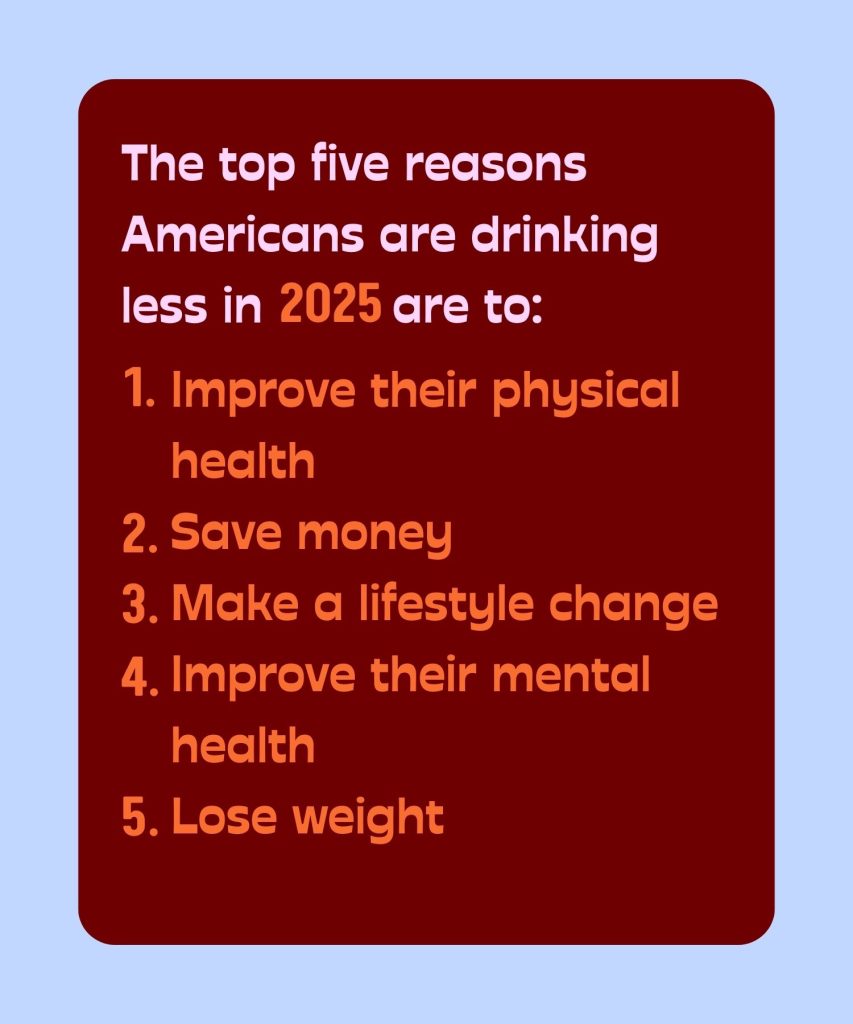
For Anne Fishkin, it was a combination of things that led her to stop drinking. “It’s really just about figuring out what is helping you grow and what’s standing in your way,” she explained. “I think for me booze was standing in my way. Like yes, it was kind of fun having a cool martini, but then I would have a headache and anxiety for three days. I asked myself, ‘is this really worth it?’ I’m wasting my time and money.”
Historically, being fully “sober” means not drinking any alcohol or taking any drugs. Fishkin feels that the sober curious approach is appealing to more people because it allows for a “gray area” where an individual can tailor their drinking patterns to their specific goals and needs.
While at first she just wanted to focus on her own habits, Fishkin’s involvement in the movement grew when she connected with her friend, Elizabeth Gascoigne, the founder of Absence of Proof, a non-alcoholic events company based in New York. In 2022, Fishkin became the director of marketing and events for the Los Angeles branch of Absence of Proof.
For her, the purpose of these events is “to have a space where people can have a great time and have a night out without feeling shame around not drinking or meeting people. I think connection and community is so important and especially when you’re going through whatever it is that you’re going through. It’s just really nice to have a cool space and project where you know everyone is showing up without a veil, nobody’s hung over and nobody’s masked by alcohol.”
“I would say people come because they want to learn something, they want to meet like-minded people, they want that sense of community and they also want to just have a great fun time. The whole point of having events is so you can still go out and have an amazing night and you don’t need booze,” Fishkin added.
The L.A. Scene – New Opportunities for Connection
Going to events focused on non-alcoholic experiences and drinks can help ease the transition for those who are sober curious. Over the past few years, Los Angeles has seen a new wave of entrepreneurs create social spaces designed to help those experimenting with saying “no” to a drink.
Obreanna McReynolds and her husband, Dean, opened Burden of Proof, the San Gabriel Valley’s first non-alcoholic bottle shop just last December. The neighborhood shop is located in South Pasadena and carries alcohol-free wine, beer and other spirits to choose from.
In the past few months since they’ve been open they have started to host events – tastings, candle classes and book swaps while sipping on NA (non-alcoholic) wine, cocktail making classes, sound baths and more – to introduce people to the sober curious and alcohol free spirit communities. They both recognize the value in fostering this sense of community through events that give people things to do that don’t revolve around alcohol, and fun ways to be out of the house and connect.
“I think half of the importance of a non-alcoholic bottle shop, besides getting the products, that’s what you come for, but you ideally stay for the community and just showing people that, oh, okay, wow, I’m not the only one that maybe doesn’t want to drink. But actually there’s a whole store here, there’s other people that are in here, people from my own community. It’s very almost validating of your choice,” McReynolds said.
“I think really what we are aiming to do is just give people a place that they can walk into, feel comfortable, validated, and a little sense of abundance,” she added.
Through Burden of Proof, Obreanna and Dean are looking to make the transition or curiosity around abstaining from alcohol a lot less intimidating.
In 2022, when they both decided to cut back their drinking they found a newly opened non-alcoholic bottle shop in Brooklyn, NY, where they lived at the time. The addition to the neighborhood couldn’t have come at a better time, and not only introduced them to the world of zero proof beverages but was also a welcoming and validating space for their journeys.
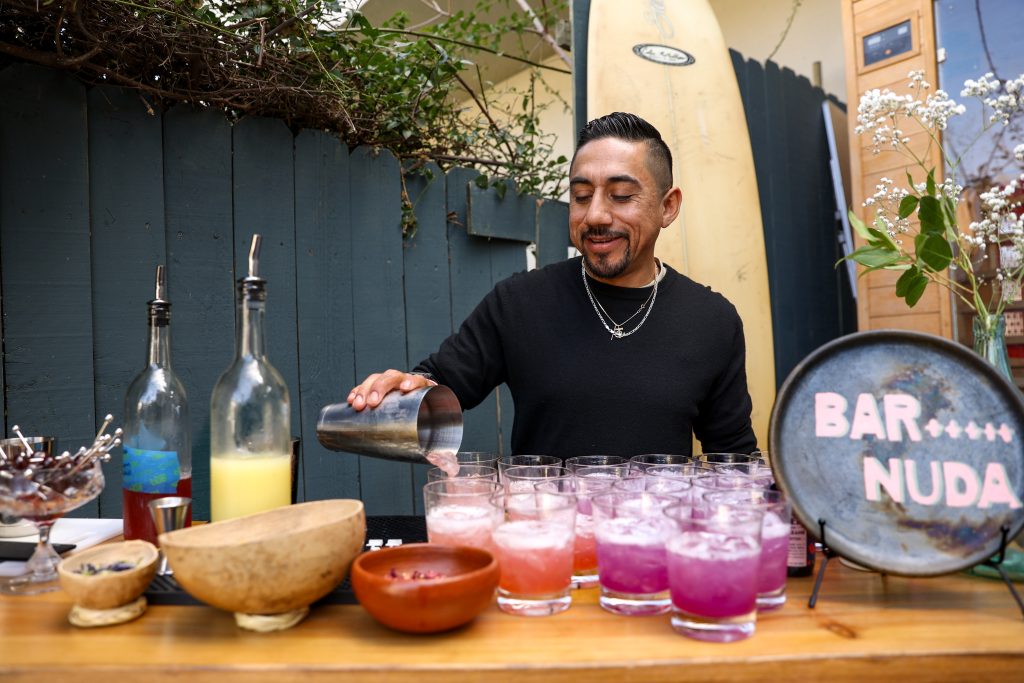
Pablo Murillo helped start Bar Nuda, a roaming Mexican inspired non-alcoholic cocktail bar and events company, “to give people a chance to socialize, go out and have a good time without the pressure of drinking booze while celebrating our heritage and our culture.” After attending an event that wasn’t serving alcohol and noticing the lack of warmth and celebration of zero-proof cocktails, Murillo and his two co-founders knew this was a space they could elevate.
Since they launched in April 2023, they have put on a variety of events transforming unusual spaces into places people who are willing to take a chance at a night out without drinking can socialize, gather and sip on non-alcoholic drinks.
Bar Nuda hosts everything from non-alcoholic cocktail making classes and wellness events to salsa lessons.
Murillo, who is now completely sober, notes that Bar Nuda played an integral part in his journey, making it easier for him to attend events that feel like parties with his friends and community.
“We don’t want you to feel like you’re missing out on life or anything like that. On the contrary, our slogan is ‘Drink to Remember’ and so we want you to go out, have those belly laughs, have that connection, foster those relationships, and go home and feel like, ‘Oh my god, I made some new friends,'” Murillo explained.
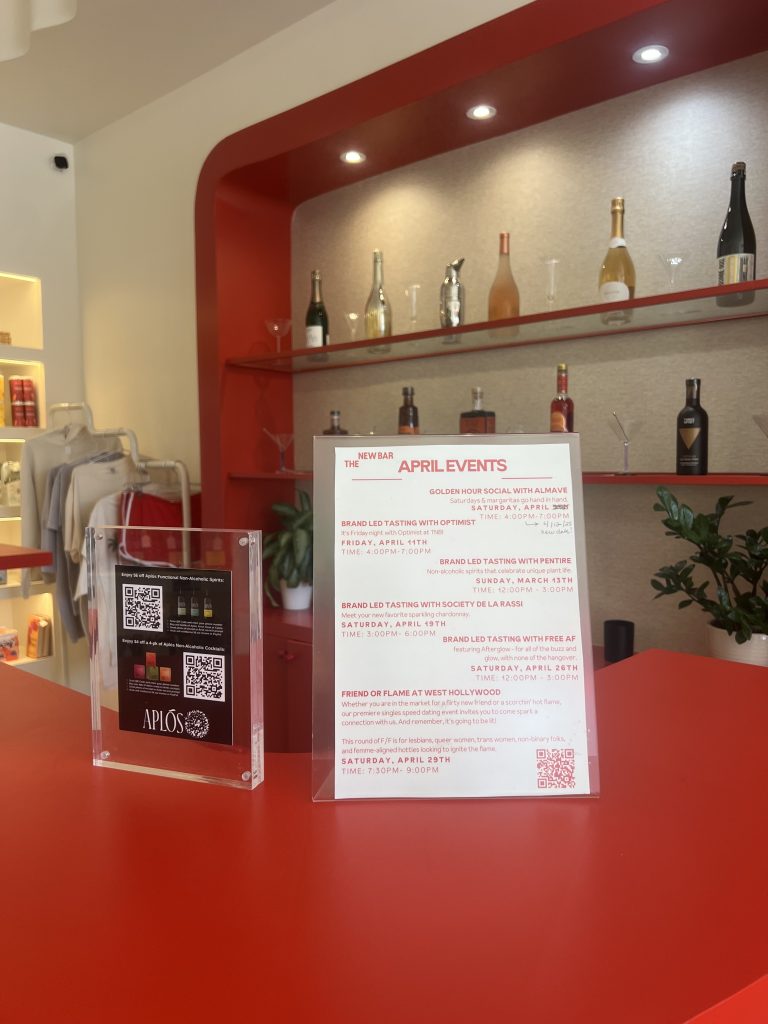
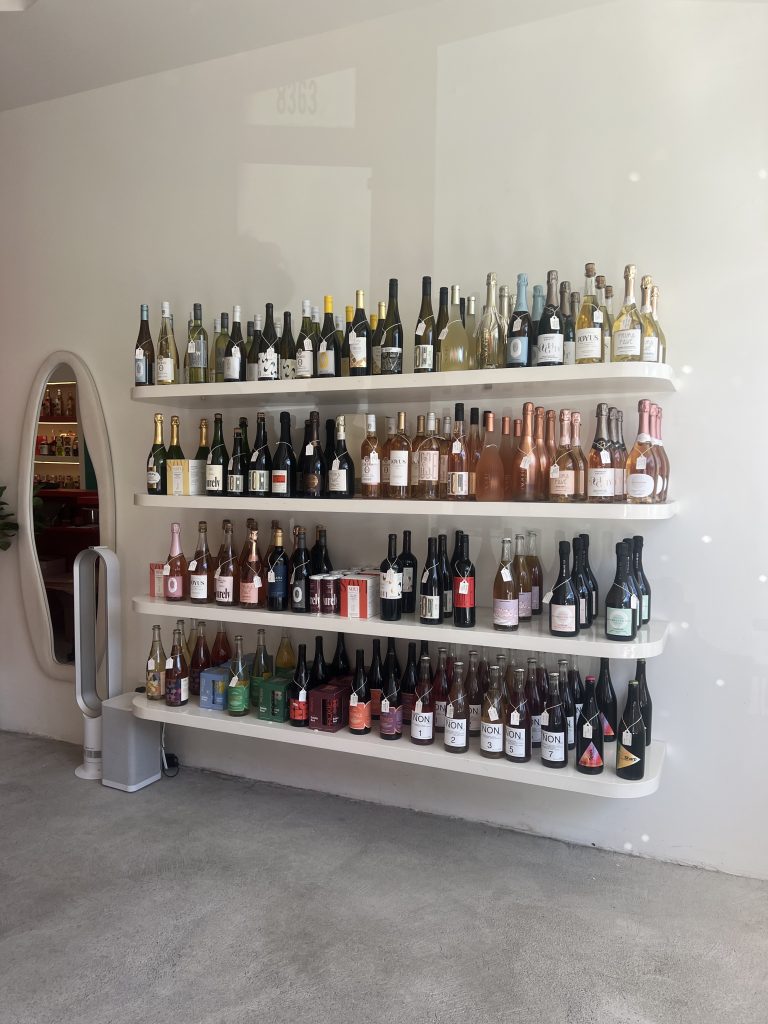
Another bottle shop, with two L.A. locations, The New Bar, aims to be a space for everybody to “put more tools in their tool kit and have whatever drink whenever they want it,” not just those who are completely sober, Theodore Kinman, the L.A. area manager, said.
Their brick and mortar stores are stocked with a curated selection of non-alcoholic beverages and they have really leaned into the intention of making the “ambiance” of a drink accessible to everyone.
“There’s something unique about what alcohol does for people, it’s obviously a very social drink. and so our main intent is to bring people together, help people gather and help people curate drinks at their home without having to dabble into ethanol,” Kinman explained. The New Bar’s programming varies between locations with events such as speed dating and wine pairings!
Behind Shifting Habits
The sober curious movement first started in 2018 when Ruby Warrington coined the term in her novel that explores the positive effects of sobriety and reduced alcohol consumption on one’s lifestyle, however it wasn’t always as popular as it is today.
The COVID-19 Pandemic left people bubbled within the perimeters of their home walls with limited options of what to do. And so, bottles of wine were opened and beer cans were crushed.
As a result, in 2020 the largest change in per capita alcohol consumption within the last 50 years occurred with a 2.9% increase, according to the National Institute on Alcohol Abuse and Alcoholism.
Fast forward to 2025 and the growing interest is now in non-alcoholic drinks, with over 58% of Americans planning to consume some type of NA beverage.
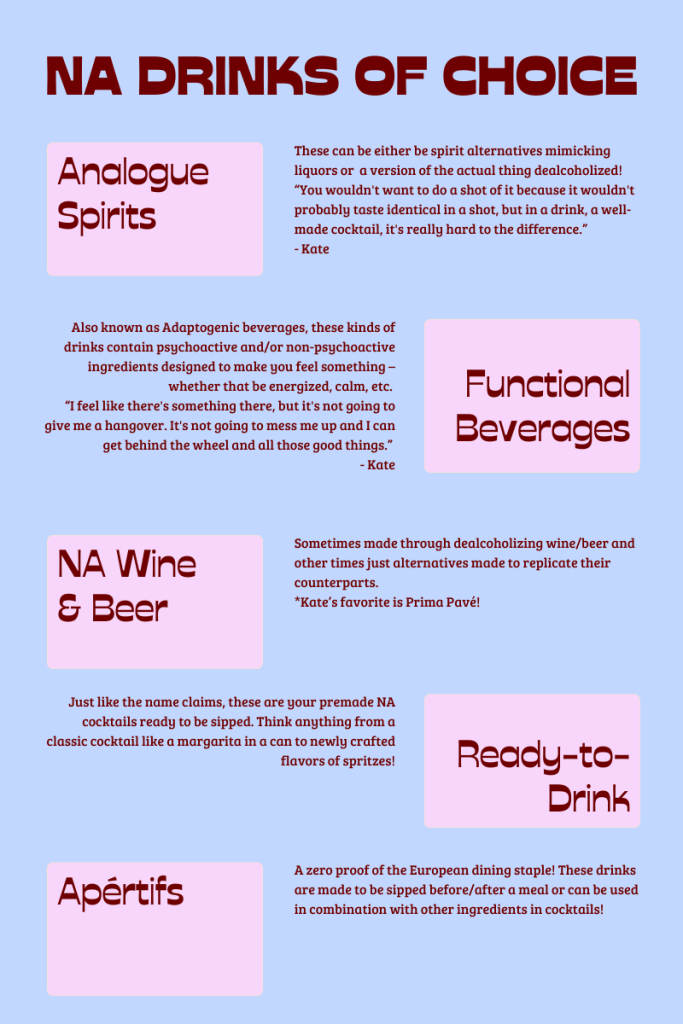
In January of 2025, the U.S. surgeon general issued a warning about the relationship between alcohol use and cancer, calling for labels on all alcohol products to explicitly state the risk. The recommended label would include “There is a direct link between alcohol and fatal cancers,” in addition to the current warning that reads “GOVERNMENT WARNING: (1) According to the Surgeon General, women should not drink alcoholic beverages during pregnancy because of the risk of birth defects. (2) Consumption of alcoholic beverages impairs your ability to drive a car or operate machinery, and may cause health problems.” Alcohol use contributes to almost 100,000 cancer cases and 20,000 cancer deaths every year in the U.S. New labels would be reminiscent of the kinds of labels that are currently required on tobacco products and packs of cigarettes.
People have gone on social media platforms such as TikTok and Instagram to share their experiences and start conversations about their relationship with alcohol. Influencer Halley Kate posted a video titled “My thoughts on drinking” in which she tells her followers about her journey. Kate took part in Dry January at the beginning of the year and explained that abstaining from alcohol “kinda changed [her] life” and she has only drank a few times on special occasions since January 31. The 75 Hard Challenge consists of 75 days of lifestyle changes that include removing alcohol completely and is also popular for users to document.
A study on temporary alcohol abstinence challenges found that after participating, about 50% of people continued to drink less. “Alcohol serves that social lubricant purpose, but it’s always like, ‘let’s go out for a drink’ or ‘let’s go to this party and have drinks,’” Eric Pedersen, an author of the study and Associate Professor of Psychiatry and Behavioral Sciences at USC who studies alcohol use among young adults, said. “The purpose of the night is really to hang out with your friends and get together and be social and that’s just one of the pieces of it, and you’re able to do all that stuff without the intoxicating effects of alcohol. I think people are just starting to realize that.”
Social media discourse and people with large followings have the power to spread information about sober curiosity and encourage people to consider cutting back on their drinking. Not drinking is becoming more mainstream than ever before – Tom Holland even started his own zero proof beer company, BERO, last year after opening up about his own path to sobriety.
The Threat of Going Alcohol Free
Social norms may make it seem like everyone around you is drinking alcohol, but it isn’t as universal as you may think. Even within environments that do see heavy alcohol consumption, such as a college campus like USC, a substantial part of the population (20%) don’t drink at all, according to Pederson. Nevertheless, the perceived and real social repercussions of not drinking prohibit people from allowing themselves to fully reevaluate their relationship with alcohol.
Obreanna McReynolds faced an adverse reaction from those around her when she first decided to cut out drinking after reading Warrington’s book one summer years ago. “All my friends hated it and they were really skeptical and they would pressure me to drink,” McReynolds said.
“And it was weird because I mean if your friend is like, ‘Oh, every time I eat popcorn I feel sick the next day. I’m just going to stop.’ You’re not going to bug them about that. But if you’re like, ‘Oh, every time I drink wine, I feel sick the next day. I’m going to stop.’ It can be so threatening to people.”
In the past other stigmas surrounded those who chose not to drink, such as they must have use problems, which is not always the case. When Anne Fishkin first stopped drinking she was bombarded with questions of “why did you stop” and “are you okay?” While she recognizes the movement has come a long way especially with more products and information being available, Kate Danaj says “people shouldn’t have to explain why they’re drinking or not drinking, it doesn’t matter, it’s nobody’s business.”
A City of Duality
Given the large Los Angeles’ health and wellness network it may not come as much of a surprise that less people are dabbling in sobriety. However, while L.A. can very much be seen through this health lens, the nightlife and entertainment industry has always been a prominent part of the city’s history. From concerts to clubs, there is an abundance of opportunity for social engagement – and a chance to grab a drink (or two).
The sober curious movement isn’t looking to replace old ways of going out, but rather expand them to give people the freedom to take a step back and intentionally evaluate their relationship with drinking alcohol. Those who choose to abstain are no longer pushed to the corner of the bar to order a club soda with lime, now they have a melange of non-alcoholic beverages out there to try. Whether it is a NA cocktail class hosted at Burden of Proof or an A.M.RADIO coffee shop DJ set, the opportunities for connection and community without alcohol in Los Angeles are only growing.